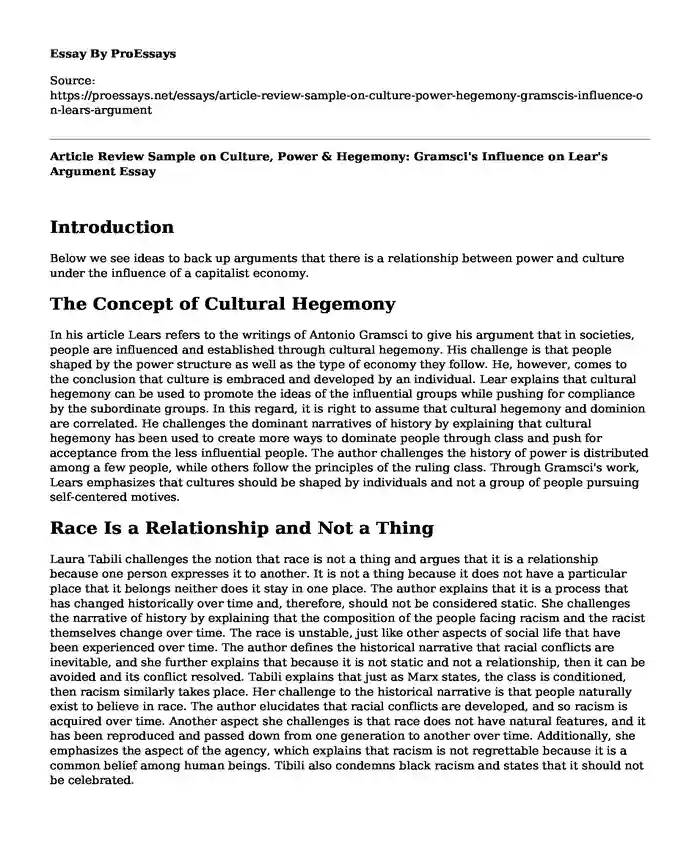Introduction
Below we see ideas to back up arguments that there is a relationship between power and culture under the influence of a capitalist economy.
The Concept of Cultural Hegemony
In his article Lears refers to the writings of Antonio Gramsci to give his argument that in societies, people are influenced and established through cultural hegemony. His challenge is that people shaped by the power structure as well as the type of economy they follow. He, however, comes to the conclusion that culture is embraced and developed by an individual. Lear explains that cultural hegemony can be used to promote the ideas of the influential groups while pushing for compliance by the subordinate groups. In this regard, it is right to assume that cultural hegemony and dominion are correlated. He challenges the dominant narratives of history by explaining that cultural hegemony has been used to create more ways to dominate people through class and push for acceptance from the less influential people. The author challenges the history of power is distributed among a few people, while others follow the principles of the ruling class. Through Gramsci's work, Lears emphasizes that cultures should be shaped by individuals and not a group of people pursuing self-centered motives.
Race Is a Relationship and Not a Thing
Laura Tabili challenges the notion that race is not a thing and argues that it is a relationship because one person expresses it to another. It is not a thing because it does not have a particular place that it belongs neither does it stay in one place. The author explains that it is a process that has changed historically over time and, therefore, should not be considered static. She challenges the narrative of history by explaining that the composition of the people facing racism and the racist themselves change over time. The race is unstable, just like other aspects of social life that have been experienced over time. The author defines the historical narrative that racial conflicts are inevitable, and she further explains that because it is not static and not a relationship, then it can be avoided and its conflict resolved. Tabili explains that just as Marx states, the class is conditioned, then racism similarly takes place. Her challenge to the historical narrative is that people naturally exist to believe in race. The author elucidates that racial conflicts are developed, and so racism is acquired over time. Another aspect she challenges is that race does not have natural features, and it has been reproduced and passed down from one generation to another over time. Additionally, she emphasizes the aspect of the agency, which explains that racism is not regrettable because it is a common belief among human beings. Tibili also condemns black racism and states that it should not be celebrated.
Gender and the Practices of Scientific History
Bonnie Smith, in his work, explains that gender played a critical role in scientific advancement, a fact that was not acknowledged in the historical narratives. He goes on to emphasize that the lack of recognition of gender is the reason why professions were developed and believed to be a male affair. The author challenges the historical narrative that careers such as jurists, theology, bankers, which most people trained in the past, were meant for men. He explains that history developed a great deal of gender profiling, which today makes no sense because professionals are not characterized by their gender but merit. Smith explains that form the archive reports indicated that women set the rules of etiquette, and this implies that they were the originators of codes of conduct even when they were not regarded as lawyers or jurists. He explains that the historical practices of glorifying men as the dominant gender and leaving out women were backward and uncalled for. He challenges the history of gender as fragmenting and without sound foundations to justify the studies of men being better leaders and scholars in society.
Conclusion
The people with any form of influence in society, for instance, economically, politically, or by any means, will want to dominate and continue taking charge. Still, the issue is changing because people are getting revolutionized.
References
Lears, T. J. (1985). The concept of cultural hegemony: Problems and possibilities. The American Historical Review, 567-593.
Smith, B. G. (1995). Gender and the practices of scientific history: the seminar and archival research in the nineteenth century. The American Historical Review, 100(4), 1150-1176.
Tabili, L. (2003). The race is a Relationship and Not a Thing. Journal of Social History, 37(1), 125-130.
Cite this page
Article Review Sample on Culture, Power & Hegemony: Gramsci's Influence on Lear's Argument. (2023, Sep 25). Retrieved from https://proessays.net/essays/article-review-sample-on-culture-power-hegemony-gramscis-influence-on-lears-argument
If you are the original author of this essay and no longer wish to have it published on the ProEssays website, please click below to request its removal:
- Event Planning and Report Paper Example
- Essay Sample on Diversity Consciousness
- Essay on Michael Kuo: Resisting Myths, Confronting Challenges, Finding a Savior
- Class and Power Dynamics in Wuthering Heights and Recitatif - Essay Sample
- Investigating Cost Behavior With Community Social Capital - Essay Sample
- Modern Health Care: Improved Facilities for Global Well-Being - Essay Sample
- Essay Example on Corporate Social Responsibility: Enhancing Brand Value & Improving Society







